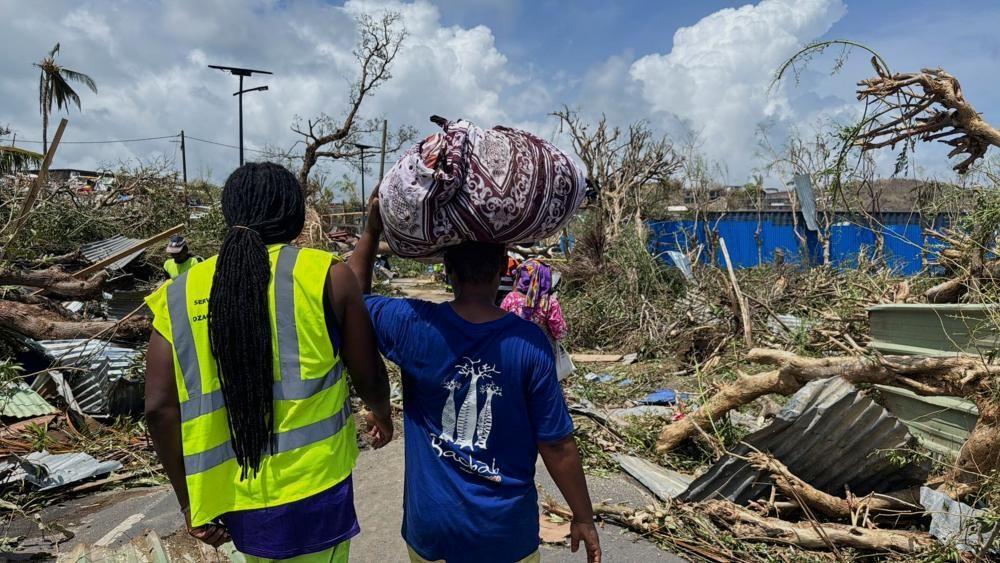Residents of Mayotte have described the aftermath of Cyclone Chido, which struck the French Indian Ocean territory with unprecedented ferocity, as “apocalyptic.” With wind speeds exceeding 225 km/h (140 mph), the cyclone wreaked havoc, particularly in impoverished areas where residents lived in flimsy sheet-metal housing. The storm has left many without basic necessities; one Mamoudzou resident reported a lack of water for three days, expressing concern for neighbors who are suffering from hunger and thirst. In response, French President Emmanuel Macron pledged to visit the island in the coming days to support rescue efforts and the local population while announcing plans to declare a national day of mourning for the victims.
Despite ongoing rescue operations involving French reinforcements, the region faces severe challenges in assessing casualties and providing immediate relief to survivors. While the confirmed death toll stands at around 20, local authorities caution that the true number could reach thousands, especially among undocumented migrants who are part of the island’s population of 320,000. This demographic complexity complicates rescue and recovery efforts, with officials struggling to establish contact with many affected individuals. Widespread destruction of infrastructure, such as downed power lines and blocked roads, has hampered the delivery of aid and complicated search-and-rescue missions.
As relief assistance begins to trickle in, significant shortages of food, water, and shelter persist. An alarming 85% of the territory remains without power, and many residents lack access to clean drinking water. Healthcare professionals on the island, like midwife Amalia Mazon, reported that the available water supply is contaminated. “The water here is completely yellow. It’s unusable for us,” she lamented, highlighting the dire conditions and sense of abandonment felt by many residents. French authorities, including Acting Health Minister Geneviève Darrieussecq, confirmed that the cyclone had severely degraded the healthcare infrastructure, which varies in quality across the archipelago.
The historical context of Mayotte illustrates why the island’s residents, especially its vulnerable communities, were particularly susceptible to the cyclone’s devastating impact. France colonized Mayotte in 1841, and while the Comoros voted for independence in 1974, Mayotte elected to remain part of France. However, the island has since struggled with entrenched poverty, high unemployment rates exceeding 30%, and political instability. Over 75% of the population lives below the national poverty line, leaving communities ill-prepared to withstand the kind of catastrophic weather event brought about by Cyclone Chido. Local testimonies portray a harrowing scene where families have literally lost everything, with one nurse describing the destruction as reminiscent of a nuclear disaster.
Rescue operations are underway with the involvement of French military personnel and local volunteers coordinated from Reunion Island, but the scale of the devastation raises concerns about the adequacy of these efforts. Francois-Xavier Bieuville, the prefect of the island, warned that the death toll might soon surpass several hundred, underscoring the urgent need for a comprehensive assessment of the damages. The grim reality for many families indicates that they are already facing hunger and lack of access to essential services, which adds urgency to the humanitarian response. Helping undocumented migrants has proven particularly challenging, as traditional methods of documenting casualties become complicated by the customs of swift burial in the Muslim tradition.
As Cyclone Chido moves away from Mayotte, it has affected neighboring Mozambique, bringing with it destructive winds and flash flooding, with reports of additional casualties and infrastructural damage. Aid agencies on the ground are expressing concerns over the loss of critical services, including healthcare and sanitation, which heighten the risk of disease outbreaks like cholera and malaria. Sarah Keith-Lucas from the BBC Weather Centre linked this severe weather event to broader climate trends, noting that while storms may not be increasing in frequency, their intensity is likely influenced by climate change. The cyclone has since weakened to a depression after impacting Mozambique, but significant rainfall remains expected in the following days, potentially exacerbating the situation for affected communities in both regions.
In light of this catastrophe, the road to recovery for Mayotte will be long and challenging, necessitating both immediate relief efforts and longer-term plans to bolster infrastructure and services in a region already struggling with socio-economic vulnerabilities. The overwhelming destruction of homes and critical facilities demands a robust humanitarian response, coordination between local and national authorities, and the involvement of international aid organizations to navigate the complexities of the situation. As Mayotte grapples with this disaster, the experiences of its residents and their pressing needs must remain at the forefront of recovery discussions, compelling stakeholders to come together in solidarity to rebuild lives and communities in the wake of this unprecedented storm.

